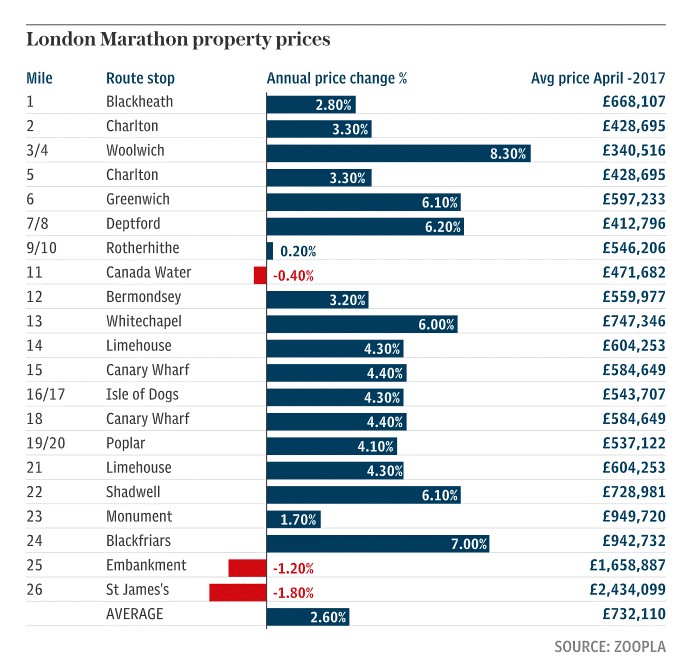321: Property investors – is it time to bail out?
05-13-2010
 PropertyInvesting.net team www.google.co.uk
PropertyInvesting.net team www.google.co.uk
Mini-Boom:
Labour’s mini-mirage boom in the run up to the election succeeded in gaining them a few percentage points at the polls. But it was not enough to keep them in power – they were short of about 4%. It’s remarkable how politically divided the UK now is. The Tories only got 15% of the Scottish vote. Labour dominate Scotland and northern England – particularly the urba n areas. Meanwhile the Conservative dominate England, particularly outside urban areas. The one good think Labour did for property investors was harmonize the capital gains tax and reduce it on property from 40% to 18%. Despite this boost in the last two years, property investment, building and new re-developments by private individuals has stayed at very subdued levels. If capital gains tax goes up, then there would be even less private property investment, far less buy-to-let properties for rental and a worsening of the housing crisis. Already the population is due to increase from 60 million to 70 million by 2030, but only a net 80,000 new homes are being built each year. Shortages of property in southern England are acute – any increase in CGT will make matters worse.
n areas. Meanwhile the Conservative dominate England, particularly outside urban areas. The one good think Labour did for property investors was harmonize the capital gains tax and reduce it on property from 40% to 18%. Despite this boost in the last two years, property investment, building and new re-developments by private individuals has stayed at very subdued levels. If capital gains tax goes up, then there would be even less private property investment, far less buy-to-let properties for rental and a worsening of the housing crisis. Already the population is due to increase from 60 million to 70 million by 2030, but only a net 80,000 new homes are being built each year. Shortages of property in southern England are acute – any increase in CGT will make matters worse.
Capital Gains Tax Nightmare:
Well – what we are now hearing is the Liberal Democrats original idea of a 40% or 50% capital gains tax has been supported by the Tories and is almost certain to come into force. This means, if you sell a second home or a buy to let property and have made capital gains – then tax on this “profit” or gain will be at a rate of 40% rather than 18% - a massive hike. It could even be 50% (or 50% of high earners only). In any case, the massage from us is, it’s highly likely to happen. There may also be no tapered relief. These rumours have roots. It’s rather unlikely but still possible if could start on the day of the emergency budget, or be retroactive to 6 April 2010. But it’s more likely to start 5 April 2011, for the next tax year.
Sell: So if you have a large property portfolio, and are a private individual, with properties not in a tax protected trust or entrepreneurial company structure, then our advice is – consider bailing out as soon as possible. Don’t hang around until the end of the year, because there will be huge volumes of property hitting the market at the same time, trying to beat the tax deadline of 5 April 2011. We’ll know in 45 days whether these rumours are true, but from our experience, tax rumours are often leaked to see what the public and media reaction is – then implemented if the reaction is not too severe. Expect it to happen – yes, it’s a disaster. Exactly what all property investors have been dreading. But it will happen. No point hanging around and arguing about it. Best act with your feet and sell some properties quickly. Otherwise you’ll be in the middle of a true fire sale.
Euro Bailout Mirage Money:
The other reason to consider selling some properties is that the 700 Billion Euro of European mirage money has been promised to help bail out countries in Europe – like Greece, Spain and Portugal. This has in our view temporarily propped up the European economies – and stemmed a sovereign debt financial meltdown. But it’s only a temporary fix. It’s not real money – just a promise. If it was real money, in a way, that would be even more serious because it needs to be paid back unless we are missing something. How can you have sovereign debts of over 100% of a country’s GDP and a deficit of 13% - sounds close to bankrupt to us. Certainly if you were a private individual, no bank would lend you money. This financial fix will likely start showing severe signs of stress within about a year. Then there will be a European sovereign debt meltdown. The Euro is no longer a safe haven. Not with oil prices over $70/bbl in any case. Euro denominated countries produce almost zero oil, but consume huge quantities – about 10 million barrels a day. That’s $800 million a day, or $300 Billion a year on oil imports alone. That’s a gigantic economic burden. As oil prices rise, as China’s consumption increases and oil production stays on a bumpy plateau of ~86 million barrels a day, the European currency will become pressured again, eventually leading to it’s break-up. The German’s will not be able to tolerate toxic social debts in countries like Greece, Portugal and Spain. They’ll want their Mark back. If you like making money on shorting things, the Euro in a one year time frame is pretty much as good as you will find – particularly if oil prices rise. If you short the Euro, long oil, and long gold, as commodities prices sky-rocket again, you could triple up on profits. But property prices in European countries would drop – except for Norway which produces so much oil and gas, it has a 15% budget surplus and a hugely successful sovereign wealth fund (yes, wealth not debt).

Spillover into UK:
For the UK, the European problems will surely spill over into the UK in large part because they are our biggest trading partners, and also because UK is part of the European Union of course. The UK will have to help bail out these countries as well – and we are barely able to cope with our own mismanaged economy with deficit of 12.5% of GDP and overall debt of 100% of GDP, never mind bailing out minnows like Greece.Storm: As UK VAT rises from 18% to 20%, unemployment rises, and capital gains tax rises kick in, this will most likely marry with the Euro meltdown and Euro recession plus rising oil prices by mid 2011. So our advice is, it ain’t gonna get any better – in fact, it’s gonna get a whole lot worse.
Objectivity: We know you are probably a bit surprised at a property investment website advising on selling, but we have now seen enough evidence to suggest big problems are just around the corner. And our duty is to be objective and frank in our analysis. This may be slightly contrarian because, on the face of it, things don’t look or feel too bad, but major problems are just around the corner, so you need to ask yourself:
· If you can bag a gain with 18% tax now, why would you want to wait until the tax rate rises to 40% to 50% and the risk of European sovereign debt meltdown increases early 2011?
· Do you want to be the first one to leave the party or the last? Do you want to get caught up in a recession and a fire-sale?
· Do you really think things will have improved by mid 2011?
 Housing Market Propped Up: Labour did a great job at propping up house prices and creating a mini-boom just before the election. This always happens by design. This was in concerted along with the Bank of England who incredibly relaxed interest rates to 0.5% and printing money whilst inflation rose to 3.4% CPI 9way over the 2% target). It was just enough to stabilize property prices and cause the mini-boom rebound of about 10%-15% in property prices from March 2009 to March 2010 – particularly in southern England aided by record bank bonuses from public bail out funds. Now hard decisions are being made. The deficit has to and will be reduced along with the size of the public sector – otherwise our AAA rating will drop and interest rates will need to go way up. And regrettably it looks like the very worst nightmare for the property investor will be implemented – the dreaded 40% capital gains tax death to the property market.
Housing Market Propped Up: Labour did a great job at propping up house prices and creating a mini-boom just before the election. This always happens by design. This was in concerted along with the Bank of England who incredibly relaxed interest rates to 0.5% and printing money whilst inflation rose to 3.4% CPI 9way over the 2% target). It was just enough to stabilize property prices and cause the mini-boom rebound of about 10%-15% in property prices from March 2009 to March 2010 – particularly in southern England aided by record bank bonuses from public bail out funds. Now hard decisions are being made. The deficit has to and will be reduced along with the size of the public sector – otherwise our AAA rating will drop and interest rates will need to go way up. And regrettably it looks like the very worst nightmare for the property investor will be implemented – the dreaded 40% capital gains tax death to the property market.
 Timing:
Timing:
If you don’t trust our reading of the market moving forwards, then look back at our annual predictions for the last five years (issued end December), plus our review of the previous year’s predictions. We don’t think we’ll be far wrong again.
Property prices: are likely to drop far faster in Scotland (except Aberdeen), northern England, Midlands (out of commuter range for London), and Wales than southern England and East Anglia. The low level of house building and high demand in southern England should better support prices. If you want to take gains in the north, best act now – because prices in public sector employment dominated areas could plunge or higher capital gains taxes, high unemployment, Euro meltdown and public sector funding cuts kick in. The safest place to invest or hold is London.
We hope this Special Report has been helpful – we wish we could be a bit more positive, but unfortunately its looking even more bleak now the European Union has started printing money to the tune of 700 Billion Euro – shock and awe – you bet. The shock is the size and scale – that will eventually catch up by mid 2011.
To quote a Yorkshire man we met last year "There’s no one here but me and the and thou’s a bit stupid"



